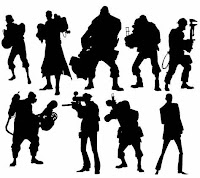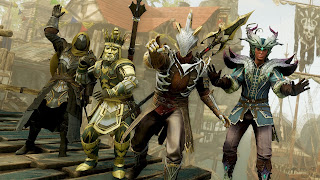 |
| The zerg approaches! |
I've jumped back into Battlefield 2042 recently and it has me thinking about player density and the impact that I, as a single player, can have on a competitive match. Battlefield games are known for their large match sizes (up to 128 players!) and big maps, but with that scale comes a loss of any single player's ability to impact the outcome.
Before we get into the larger match sizes of Battlefield games let's look at some common team sizes across games. The most common team size I can think of is 3. New World's arenas are 3v3. Apex Legends and The Finals are both 3-person squads. After 3 is 5 (and 6). Many games feature grouping sizes of 5 or 6, but not always in competitive modes (for example; New World groups are a size of 5 but there is no 5v5 mode). I think 3 hits a sweet spot where each player's contributions are maximized.
While 3 may be the sweet spot it doesn't evoke any sort of feeling of being in a battle and many games are targeting giving players that sense of battle. As the player count increases per team/side the player's ability to impact goes down.
Think about a Battlefield match with 128 players. It is chaotic and tons of fun, but of those 100+ players how many are actually having a meaningful impact to the outcome? Not many outside of maybe the elite helicopter pilot farming kills. Even with multiple points of conflict to fight over there is still likely a large number of players in any one area.
Now look at a Battlefield match of 32 players with multiple points to defend/attack. Spread out evenly that may be 4-8 players fighting over each point. Losing one or two players is going to have an impact and it's more realistic to think that a single player could go Rambo and wipe out an entire team. It also means the "elite helicopter pilot" is going to be that much more of a factor.
In a game I am much more familiar with (3,000+ hours played and climbing) is New World. There are a few modes we can zero in on: 3v3 arena, 20v20 outpost rush, and 50v50 war.
I've spoke about team sizes of 3 earlier, but a common request I see in New World is for a 5v5 mode since the group size in New World is 5. Personally 3v3 is the sweet spot. While 3v3 can get bogged down due to healing/heavy tank builds that is not that common. It is also possible for groups of 3 without a healer to compete. If the arena was 5v5 there would be no way to go other than healer + clump strategies and the matches would boil down to which healer dies first.
Jumping to the top end is war at 50v50. Having played a fair number of wars and seen a fair number more via streamers I would argue there is a limited few individual players that have a major impact and almost always the "elite helicopter pilot" is the healer. So I'd agree individual healers can have a massive impact on wars and thus anyone landing a kill shot on a healer has an impact, but otherwise war doesn't offer a lot for individuals to sway.
This takes us back to 20v20 outpost rush (OPR) and where I feel the ceiling is for individual contribution. In OPR there are multiple objectives which change over the course of a match. There are also activities that individual players can partake in that, when done well, can contribute to a team winning.
As a quick aside here, as I am noting with OPR, a lot of what a player's contribution comes down to is the design of the game mode. As we'll see breaking players up into various objectives decreases the population in any specific spot. However, this has an eventual breaking point where if player numbers are higher it doesn't matter how many objectives there is because humans tend to always favor wanting unbalanced conflict and so you end up with "zergs" of players rolling over each objective.
In OPR the 20 players per team + three main outposts to fight over with side events such as the baron fight results in a good mix of players across the match. No part of the match is really 20 v 20; it is a of 3-5 player fights. Within those smaller fights individual players can sway the match. A single player can hold off a team trying to sneak behind and take a backline outpost. A single player can gather supplies and show up in time to build doors on an outpost.
In summary: too many players is too many players no matter the design. Limiting player and providing divided objectives breaks up the action into a size where individuals have impact and when combined those impacts have an effect on the over all game mode. It feels like the 16-20 player-per-side range is where that sweet spot is hit in my experience.










